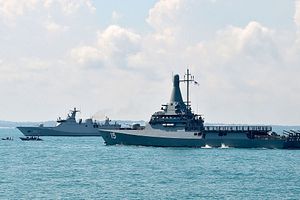On September 17, Indonesia’s defense minister met with his Singaporean counterpart Ng Eng Hen as part of a working visit to Singapore. The trip, which saw a heavy focus on counterterrorism among other issues, put the spotlight on the development of defense relationships between the two countries.
As I have pointed out before in these pages, though the defense ties between Indonesia, Southeast Asia’s largest state, and Singapore, the subregion’s smallest, have tended to be prickly historically speaking, both sides still maintain a cordial security relationship that includes the usual components, including visits, exchanges, and exercises. This aspect of ties was in the spotlight last year as well within the context of the 50th anniversary of the Indonesia-Singapore relationship.
The development of bilateral defense ties has continued on into 2018 as well, including through meetings held between the two defense ministers. Indeed, Ryacudu had in fact just met with Ng in Singapore back in June when he was attending this year’s iteration of the Shangri-La Dialogue (SLD), Asia’s premier security summit (See: “ASEAN Counterterrorism Threat in Focus at 2018 Shangri-La Dialogue”).
This week, the two ministers met again in Singapore. During the meeting, both sides discussed not only the current status of security collaboration, but also key defense agenda items that would be discussed by the heads of state of the two countries when they are expected to meet in Bali in the near future.
Unsurprisingly, counterterrorism was on top of the list of issues both sides are looking to address. A series of terrorist incidents over the past few years have made clear that terrorism in Southeast Asia has emerged as a threat to a level not seen since after the September 11 attacks, from the siege by Islamic State-linked militants in the southern Philippine city of Marawi last year to the attacks in Surabaya, Indonesia, which took place last month.
One initiative that was discussed in this respect was trilateral cooperation in the Sulu Sea. As I have noted before, though the initial collaboration was between Indonesia, Malaysia, and the Philippines, there has since been talk about broadening this to include other states as well to varying degrees, including Singapore and Brunei.
Trilateral collaboration in the Sulu Sea was fresh in Ryacudu’s mind given the fact that he had just come from a trilateral meeting regarding that arrangement with his Malaysian and Philippine counterparts in Manila. And though there were no new specifics disclosed during his meeting with Ng, the contours of the conversation were rather similar to previous interactions, with mention of building out collaboration across the maritime, aerial, and land components as well as Singapore providing assistance in some areas.
Another agenda item discussed was the development of the Indonesian-led initiative known as the “Our Eyes” initiative (OEI) – derived from the “Five Eyes” intelligence network that the United States has with its five Western allies – which, as initially outlined by Ryacudu when he formally proposed it in 2017, is an information-sharing platform for member countries to facilitate intelligence exchange on terrorism, radicalism, and violent extremism.
Though the OEI was initially talked about as an initiative between Indonesia, Malaysia, and the Philippines in line with wider trilateral cooperation (or “three eyes”), it was subsequently discussed as part of other broader multilateral discussions, including the session on terrorism at the ASEAN Defense Ministers’ Meeting (ADMM) in Manila. During Ryacudu’s meeting with Ng, Indonesia’s defense ministry said that Singapore had offered ways that the city-state could help further strengthen the OEI concept.
The two sides also discussed wider regional issues, including the agenda of upcoming ASEAN defense meetings such as the ADMM-Plus that will take place next month. As the holder of the annually rotating ASEAN chair this year, Singapore has been playing a leading role in helping shape the agenda, including on defense issues such as counterterrorism (See: “Where Are ASEAN’s Defense Initiatives Under Singapore’s Chairmanship?”).
To be sure, the meeting between Ryacudu and Ng was just the latest in a series of interactions between Indonesia and Singapore on the defense side, and we will hear much more publicly in the way of details once the two leaders themselves meet. Nonetheless, the ministerial meeting nonetheless offered a glimpse into some of the issues that are on top of the minds of policymakers from both countries as security challenges continue to play out across Southeast Asia.

































